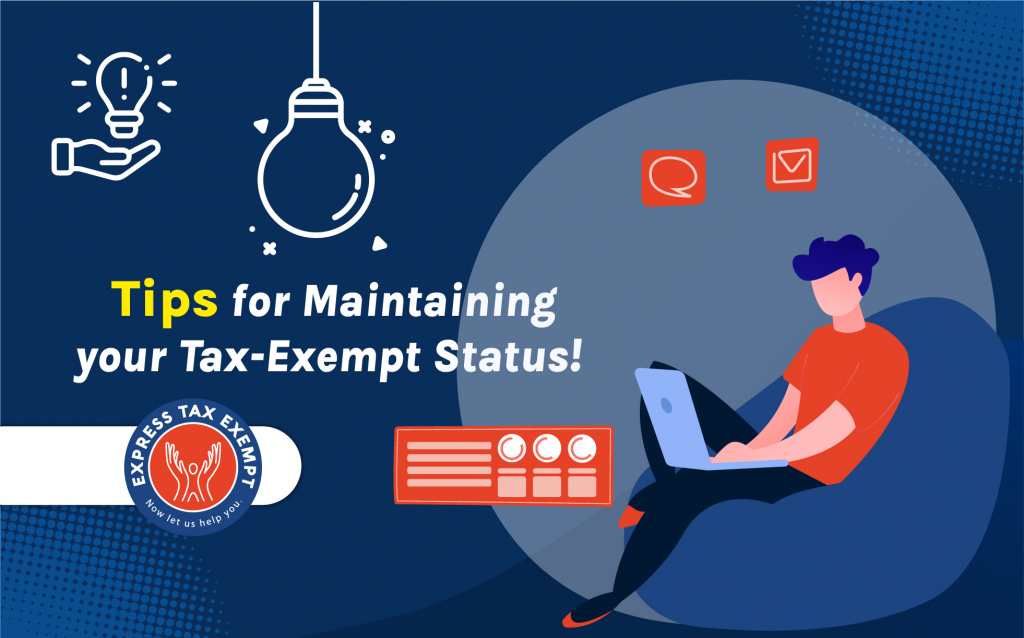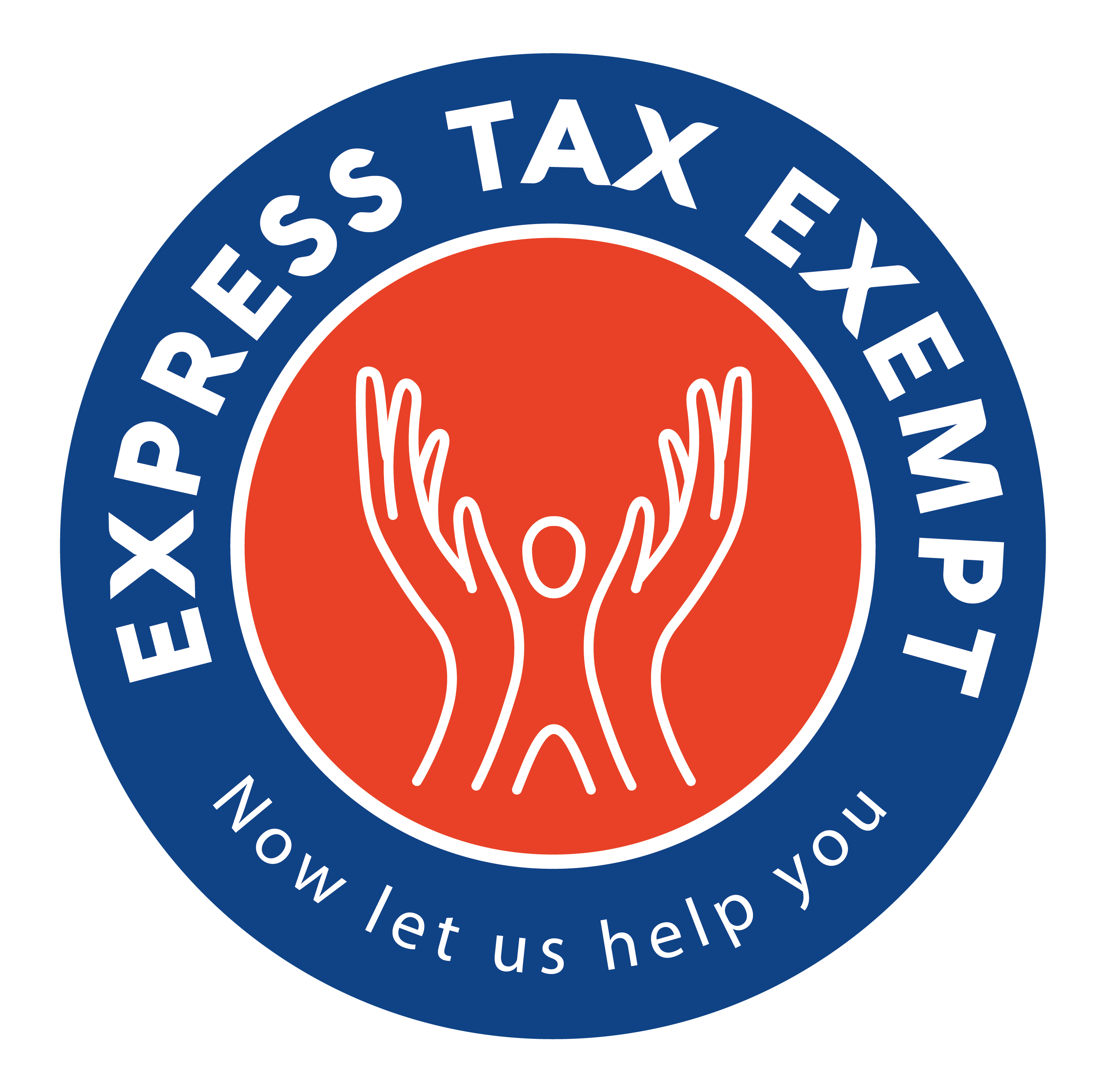Tips for Maintaining your Tax-Exempt Status!

As a tax-exempt organization, you have a lot on your plate. You also have responsibilities that you must uphold to maintain your tax-exempt status.
We’ve gathered up some useful information about maintaining your tax-exempt status and running your organization properly! Continue reading to learn more!
Keep Accurate Records
As a tax-exempt organization, there are a lot of important records your organization will need to keep track of. It is important to keep accurate and detailed records of your organization’s activities so that you can complete your annual filing requirements. Here are some important records you should keep:
Financial Records
Your organization is going to have all kinds of financial records. You need to keep any accounting information you have and records of all the money that comes into your organization and the money that goes out. You should also keep employment tax records and asset records.
- Money Coming In – Some examples of this information would be contributions, receipt books, invoices, or Form 1099-MISC documents you send to the IRS.
- Expense Records – You should save any documents that show expenses you incurred while running your organization such as account statements, invoices, and cash receipts.
- Asset Records – documents showing the items your organization owns and uses in its activities, such as investments, buildings, and furniture.
- Employment Tax Records – This includes documents that show salaries, wages, benefits paid, and taxes withheld
Permanent Records
You should maintain a set of permanent records, which includes your organizing document, a copy of your Form 1023 (the exemption application you submitted), and the determination letter from the IRS.
You should also keep copies of any returns and attachments you send to the IRS, as well as the records you used to prepare the returns. This includes your financial records and other things, like information about your organization’s programs and meeting minutes. The IRS suggests keeping copies of returns and any supporting information for at least three years after you file the return.
Accounting Periods and Methods
As a tax-exempt organization, you should always be aware of what accounting period and method your organization is using. It’s important to know whether your organization is using a calendar year or fiscal year accounting period to determine when you will need to file returns with the IRS. And, you should choose whether your organization will use a cash or accrual accounting method – or some sort of combination of the two.
Cash Accounting Method – Revenue and expenses are recorded in the period they are actually received or expended in cash.
Accrual Method – Revenue and expenses are recorded in the period they are earned or incurred, regardless of whether cash is received or disbursed in that period.
Combination of Both Methods – Cash accounting is used for some items, and accrual is used for others.
Complete Your Required Filings
You’ll probably need to file one of the Form 990-series returns – which is the annual information return required for most tax-exempt organizations. Which one you’ll file will depend on the type of organization, the amount of your annual gross receipts, and the total of your organization’s assets at the end of the tax year.
If your organization doesn’t file for three years in a row, its tax-exempt status will be automatically revoked. If your tax-exempt status is revoked for not filing – and you want to get your status back – you’ll have to redo the application process.
Unrelated Business Income
In addition to submitting an annual return, you may need to submit filings for your unrelated business income or UBI. Section 501(c)(3) organizations may need to report and pay tax on UBI, so it’s important to recognize it.
The IRS states, “for income to be considered unrelated business income, it will come from (1) a trade or business that is (2) regularly carried on and (3) is an activity that’s NOT substantially related to accomplishing the organization’s exempt purpose.”
Public Inspection
Tax-exempt organizations must make their exemption application, your determination letter, and the three most recently filed annual information returns available to the public, upon request. Also, if your organization is a 501(c)(3) and files Form 990-T, Exempt Organization Business Income Tax Return, you must make the three most recent returns available to the public.
Jeopardizing your Tax-Exempt Status
There are four major categories of activities that can jeopardize your tax-exempt status. These activities include lobbying, political campaign intervention, activities generating excessive unrelated business income, and private benefit/inurement. To protect your tax-exempt status, your organization should avoid participating heavily in these activities.
Lobbying and Political Campaign Intervention
Lobbying is any activity designed to influence legislation, while political campaign intervention is participating in a political campaign on behalf of, or in opposition to, a candidate for public office. 501(c)(3) organizations can conduct a little lobbying without jeopardizing exemption; it just can’t be a principal activity of the organization. As for participation in a political campaign intervention, tax-exempt organizations are prohibited from conducting any political activity.
Excessive Unrelated Business Income
If too many of your organization’s activities are not related to your exempt purpose, you are jeopardizing your tax-exempt status.
Private Benefit and Inurement
Private Benefit is any activity that substantially benefits the private interest of an individual or organization. 501(c)(3) organizations must avoid all activities that provide primarily private benefit. The 501(c)(3)’s activities must serve a public interest.
Private inurement within non-profit entities means that individuals within that organization may not receive excessive compensation or benefit from their employment or association. Examples of typical insiders are officers, directors, and key employees.
ExpressTaxExempt
ExpressTaxExempt is here to assist you with all of your 990 filing requirements. With ExpressTaxExempt you can e-file Form 990, 990-EZ, 990-PF, 990-N, 990-T, CA- Form 199, and Form 1120-POL quickly and easily!
Related Posts
-
 Becoming a Nonprofit or Tax-Exempt Organization
No Comments | Jul 21, 2015
Becoming a Nonprofit or Tax-Exempt Organization
No Comments | Jul 21, 2015 -
 Is My Nonprofit Responsible For Filing 1099 Forms?
No Comments | Mar 27, 2018
Is My Nonprofit Responsible For Filing 1099 Forms?
No Comments | Mar 27, 2018 -
 Find Your Tax Year Dates
No Comments | Oct 6, 2015
Find Your Tax Year Dates
No Comments | Oct 6, 2015 -
 Non-Profit vs. Tax-Exempt Organizations
No Comments | Jul 23, 2015
Non-Profit vs. Tax-Exempt Organizations
No Comments | Jul 23, 2015
